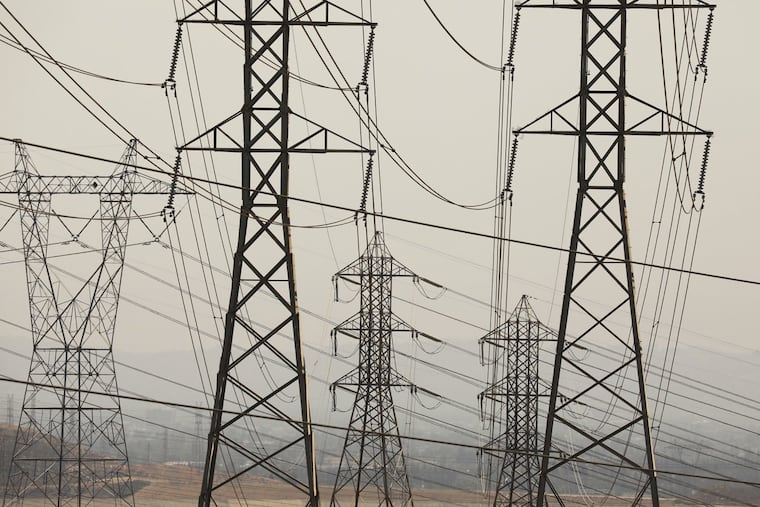Gasoline prices are down. But Peco’s electricity price is going up 11%.
Peco will raise energy charges for sixth straight quarter, up 36% in 18 months. For customers who shop for power, cheaper options are scarce.

Gasoline pump prices have fallen steadily for nearly two months now, but it’s a different story for electricity prices.
Peco’s residential electric price is set to increase by 11.4% on Sept. 1 for most residential customers, or about $6.53 a month for a typical household bill. Peco’s electricity supply charge has increased 36% over six consecutive quarters since prices bottomed out in March 2021.
That’s a $16.80 increase in a monthly bill in the last 18 months for a household using 750 kilowatt hours (kWh), the average monthly usage.
Utility energy supply charges apply only to customers who do not buy their power from a competitive energy supplier. About 24% of Peco customers buy their power from a third-party supplier, whose price may be different from the utility’s default rate.
Customers hoping to find cheaper options on the PUC’s papowerswitch.com website, where many competitive suppliers post offers, will have few choices. The unwillingness of suppliers to commit to discounted prices may reflect skepticism that electricity prices are coming down soon.
Electricity prices around the region
Peco is among five Pennsylvania electric utilities that adjust their electricity charges quarterly to reflect market changes in the price of energy. The supply charge represents the actual cost for utilities to buy the electricity on behalf of their customers, and the Pennsylvania Public Utility Commission does not allow utilities to make a profit from it.
Metropolitan Edison, which serves 560,000 customers in Southeastern Pennsylvania including portions of Montgomery, Chester and Bucks Counties, will increase its charge by 18.4%, or nearly $11 a month for customers using 750 kWh, according to the PUC.
PPL Electric Utilities, which also serves some Philadelphia suburbs, adjusts its energy prices every six months and is not due for a change until December.
New Jersey residential electricity customers are largely immune from the market fluctuations, since Garden State regulators set annual energy prices for customers that go into effect on June 1 and stay in place for 12 months.
Electricity prices are largely linked to the cost of natural gas, the principal fuel used by power generators. Unlike crude oil, whose price has declined in recent months as motorists curtailed driving, natural gas supplies have remained tight for most of the summer, according to the U.S. Energy Information Administration. Global demand for natural gas is likely to remain elevated into the winter as Europe struggles to replace Russian energy cut off because of the Ukraine conflict.
Less shopping around?
Fewer retail customers appear to be shopping for electricity supply in the last year in a climate where energy prices are increasing. Many utilities, such as Peco, base their default price on a basket of short-term and long-term energy contracts, some of which were struck when market prices were lower. Most competitive suppliers price their products on current market prices, making it difficult to compete when market prices are rising.
Nearly 100,000 fewer Pennsylvania customers bought from competitive suppliers in July compared to September 2021, according to PUC data. Among Peco customers, the shopping customers declined 7.6% in the last 10 months, from 447,000 to 413,000. Peco has about 1.6 million customers.
According to a recent review of the PUC’s papowerswitch.com website, no suppliers offered fixed-rate deals priced below Peco’s current or upcoming default price. Just two suppliers offered variable-rate products that were priced below Peco’s price, but their price was guaranteed only for one month.
A popular alternative means to secure a discounted rate from a competitive supplier appears to be no longer available in Pennsylvania. Under the Standard Offer Program, suppliers agreed to provide customers with a 7% discount off a utility’s current price for 12 months, an incentive for customers to enroll and possible remain with the supplier after the fixed-price term expired.
The Standard Offer was particularly attractive in the last year, when customers could sign up at a discount rate ahead of a utility’s announced price increase, initially locking in a discount that was even greater than 7%.
But the option is not available currently because no suppliers are signed up to participate in the Standard Offer Program among any of the state’s seven large investor-owned utilities, said Nils Hagen-Frederiksen, PUC spokesman.
Your Peco bill
Customers can determine whether they currently are enrolled with a competitive supplier by checking their monthly electric bill. The supplier’s name and contact information are listed on the first page of the Peco bill. On the bill’s second page, the supplier’s charge per kilowatt hour is listed under “Electric Supply.” That charge can be compared with Peco’s default rate, which is listed as the “price to compare” under the heading “Message Center,” also on the bill’s second page.